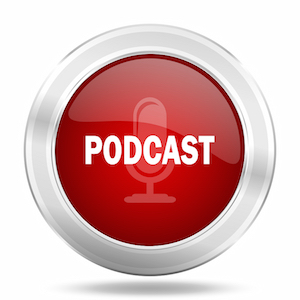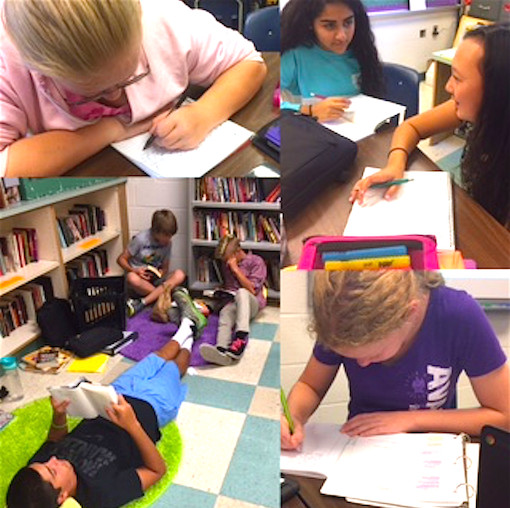Class Podcasts: Listening to Student Writers
The great writing teacher Donald Graves observed that entire teaching careers can pass without teachers ever accessing the most valuable knowledge at their disposal – the thoughts and feelings of one’s students.
By acting on this observation, I’ve discovered that adolescents and teenagers talk about writing. They mentor one another about writing. They share their writing. Simply put, adolescents are developing an understanding of certain components of writing, without us, outside of the classroom. This is incredible to me. And a very very good thing.
The Classroom Podcasts: Listening to Kids
Last year, I began recording conversations with my student writers. Through conferring with our students, we can create the conditions for adolescents to know that their voice matters, and their explanations of what they do when composing writing can make us better teachers.
As we conferred in the podcasts I’ve shared below, my 8th graders reminded me of the significance of taking the time to build a writing community, of making sure students have writing partners, and of creating the conditions of trust – at least trust with one other person in the room.
Of course, I want my students to come to trust me as a writing mentor, but they need more than me in our writing community. I am just one member of a classroom of writers and mentors. Fortunately, I’ve found that an entire community of adolescent writers is alive and well outside of our classrooms.
While these three episodes of my podcast The Classroom cover three different topics, the foundation of what students are doing outside the classroom resonates within each episode. I hope you find what you hear in The Classroom useful. I hope that it sparks more conferring in classrooms across the country. If you like what you read and listen to here, you can continue to follow The Classroom podcasts by subscribing to it on any podcast app, through iTunes, or by following me on Twitter or at brianjkelley.net.
Episode One: Comfortable with Each Other
In Episode One, I sit down with Gillian and Paige and simply ask them to tell me about their reading and writing lives. It is September and I am still building my knowledge base of each of my new young writers.
Early in the podcast, Gill and Paige share their perceptions of themselves as writers. And, as so often happens, a student says something that sparks a deeper conversation…and deeper learning.
Both students tell me that they write outside of school, but Gill adds that she and her friends write together outside of school.

As you listen to the podcast, consider the significance of what each adolescent states in their own way: we are all close friends, and we are comfortable with each other.
Encouragement moves writers. Students can learn how to talk about writing (beyond correcting errors) in a supportive and helpful manner. They actually already have an instinct for it – of how it works and when it does not work.
Listen to EPISODE 1
Episode Two: A Writing Sanctuary
When Grace spoke with me I was moved (in the moment) by how often she used certain clauses:
- I used to
- we liked
- I loved
- we loved
Grace, like so many kids who speak with me, used to read and write on her own. In our podcast, Grace describes sitting under chairs and desks in her elementary school classrooms. In these cozy sanctuaries, Grace passed notebooks of original stories to friends. Friends wrote feedback. Friends spoke feedback. Children were living a writing workshop without grades or standards (or adults).
And Grace reminds us that she loved it.

Grace reminds us “when [students] have such rigid guidelines [students] get so nervous about [their] writing.”
Grace is wise and honest and sincere. Her words match the research of Janet Emig, Mina Shaughnessy, Don Graves, James Britton, et al. When I hear her say, “I loved it – I loved it so much,” I hear it as a bittersweet moment for all of us in education.
So many of us love our profession. And when this sort of resignation arises…when we hear that a love of reading is gone in an adolescent…it hurts.
We work hard to do right by our kids. But American classrooms mortgage love and joy in the name of teaching how to take a test and the increasingly popular mantra: “they will need this in high school, in college, in business…”
I get it. We have standards. We have goals. We owe adolescents the best possible shot at an education that will take them as far as they want to go. But at the expense of happiness? At the expense of losing something you love so deeply that you want it to be a part of your life forever?
Listen to EPISODE 2
Episode Three: Detachment & Attachment
Recently, I have been thinking a lot about the decisions we make as teachers – and which decisions create possibilities for growth.
When Olivia sat down with me for episode three of the second season of The Classroom, her experiences addressed engagement (even though she does not use that word). Specifically, Olivia’s word, detachment, caught my interest.
I encounter many adolescents who no longer identify themselves as a readers or writers in middle school. Yet they remember enjoying reading and writing in elementary school. In this podcast episode, Olivia admits spending all of her free time reading when she was a child. And now, like so many other adolescents, Olivia tells me that she rarely initiates any reading or writing by herself.

This isn’t an argument against homework as much as it is a warning signal. Parents and teachers, more than ever, must be models of reading and writing if we are to have any chance of current generations engaging in it outside of the classroom.
Olivia adds that once middle school hit, she no longer saw reading and writing as a priority. She admits to lounging around in the summertime with her digital device in lieu of reading and writing.
Some may blame the device – and that is tempting – but the device didn’t break Olivia’s cycle of reading and writing. Homework did. So many adolescents turn to their phones because they are bored (they tell me repeatedly), and neither reading nor writing stands tall as a priority after they finish their homework.
So students turn to what has always been a priority for adolescents and teenagers – connecting with friends. Perhaps kids aren’t “addicted to their phones”…they might just be addicted to their friends, as I was in the 1970s and 1980s. Just as adolescents and teenagers will always be.
However, the most sobering moment during my chat with Olivia is when she describes reading a book (written for adults) that she liked, but she stopped halfway through it so she could catch up with homework. That book still sits unfinished in her bedroom, to which Olivia says, “…it’s kind of a sad…I was looking forward to finishing that story.”
Please do not read this as an indictment of any teacher or school. What Olivia describes is a well-known, documented, circumstance across the country from 6th through 12th grade – the balance of creating conditions for reading and writing for success in life and reading and writing for success on tests. This is the reality for American teachers in 2016.
In the podcast, Olivia tells me that she is not a writer, yet she shares details of a rich writer’s life. All of the conditions have been in place for her! When Olivia tells me about listening to Korean music and copying the lyrics, she says, “it is fun to write.”
And what is fun? The act of writing about what interests her, the act of conversation with friends, the act of sharing an experience. Read (or listen) between the lines. What moved Olivia a few inches forward towards reestablishing a reading and writing life? Adults and friends serving as mentors and models – the people in her life who encouraged and shared in an experience.
Listen to EPISODE 3
We Need to Model Life’s Priorities
All adolescents need our best. They need us to model how and why reading and writing is a priority for a life full of joy and depth. Our students need people to help them see where and why they can reattach themselves to the power and purpose that reading and writing helps us access.
And perhaps, more than anything else, students need all adults (teachers, administrators, and parents) to think long and hard about how we can reveal to them the things that we value outside of school. Out there where life really is.
__________
Brian Kelley is an 8th grade teacher in Pennsylvania and co-director of the Pennsylvania Writing & Literature Project. Currently, he serves as a reviewer for Voices in the Middle and has published professional articles in English Journal and California English. Follow Brian on Twitter (@_briank_), or his blog Walk the Walk, or subscribe to his weekly education podcast (The Classroom) which models individual and group conferring with students.





































I love it! Things that are simple, and obvious but are often forgotten.
Thank you, Maria! I wrestle with not forgetting. After twenty-two years in teaching, I find myself writing to question what school is really set up to do. Not what we say it does, but what we see and hear going on. The state assessments are a convenient validation of questionable and short-sighted expectations.